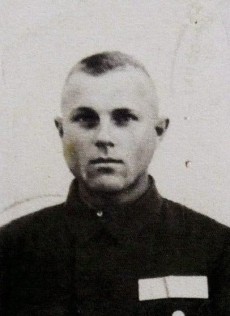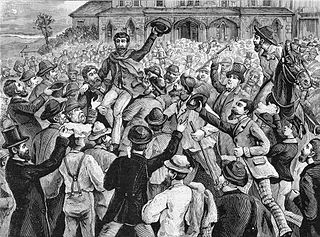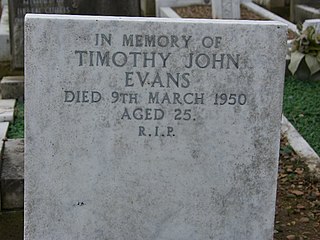In United States law, an Alford plea, also called a Kennedy plea in West Virginia, an Alford guilty plea, and the Alford doctrine, is a guilty plea in criminal court, whereby a defendant in a criminal case does not admit to the criminal act and asserts innocence, but accepts imposition of a sentence. This plea is allowed even if the evidence to be presented by the prosecution would be likely to persuade a judge or jury to find the defendant guilty beyond a reasonable doubt. This can be caused by circumstantial evidence and testimony favoring the prosecution, and difficulty finding evidence and witnesses that would aid the defense.
In law, a plea is a defendant's response to a criminal charge. A defendant may plead guilty or not guilty. Depending on jurisdiction, additional pleas may be available, including nolo contendere, no case to answer, or an Alford plea.

John Demjanjuk was a Trawniki man and Nazi camp guard at Sobibor extermination camp, Majdanek, and Flossenbürg. Demjanjuk became the center of global media attention in the 1980s, when he was tried and convicted in Israel after being misidentified as "Ivan the Terrible", a notoriously cruel watchman at Treblinka extermination camp. In 1993 the verdict was overturned. Shortly before his death, he was tried and convicted in the Federal Republic of Germany as an accessory to the 28,060 murders that occurred during his service at Sobibor.

Mark Fuhrman is a former detective of the Los Angeles Police Department (LAPD). He is primarily known for his part in the investigation of the 1994 murders of Nicole Brown Simpson and Ron Goldman in the O. J. Simpson murder case.

Lance Allan Ito is an American retired judge, best known for presiding over the criminal trial for the O. J. Simpson murder case, held in the Los Angeles County Superior Court in 1995.

In common law jurisdictions, an acquittal means that the prosecution has failed to prove that the accused is guilty beyond a reasonable doubt of the charge presented. It certifies that the accused is free from the charge of an offense, as far as criminal law is concerned. The finality of an acquittal is dependent on the jurisdiction. In some countries, such as the United States, an acquittal prohibits the retrial of the accused for the same offense, even if new evidence surfaces that further implicates the accused. The effect of an acquittal on criminal proceedings is the same whether it results from a jury verdict or results from the operation of some other rule that discharges the accused. In other countries, like Australia and the UK, the prosecuting authority may appeal an acquittal similar to how a defendant may appeal a conviction — but usually only if new and compelling evidence comes to light or the accused has interfered with or intimidated a juror or witness.
Prejudice is a legal term with different meanings, which depend on whether it is used in criminal, civil, or common law. In legal context, prejudice differs from the more common use of the word and so the term has specific technical meanings.

A miscarriage of justice occurs when an unfair outcome occurs in a criminal or civil proceeding, such as the conviction and punishment of a person for a crime they did not commit. Miscarriages are also known as wrongful convictions. Innocent people have sometimes ended up in prison for years before their conviction has eventually been overturned. They may be exonerated if new evidence comes to light or it is determined that the police or prosecutor committed some kind of misconduct at the original trial. In some jurisdictions this leads to the payment of compensation.

Martha Elizabeth Moxley was a 15-year-old American high school student from Greenwich, Connecticut, who was murdered in 1975. Moxley was last seen alive spending time at the home of the Skakel family, across the street from her home in Belle Haven. Michael Skakel, also aged 15 at the time, was convicted in 2002 of murdering Moxley and was sentenced to 20 years to life in prison. In 2013, Skakel was granted a new trial by a Connecticut judge who ruled that his counsel had been inadequate, and he was released on $1.2 million bail. On December 30, 2016, the Connecticut Supreme Court ruled 4–3 to reinstate Skakel's conviction. The Connecticut Supreme Court reversed itself on May 4, 2018, and ordered a new trial. On October 30, 2020, the 45th anniversary of Moxley's murder, the state of Connecticut announced it would not retry Skakel for Moxley's murder. The case attracted worldwide publicity, as Skakel is a nephew of Ethel Skakel Kennedy, the widow of U.S. Senator Robert F. Kennedy.

The Criminal Justice Act 2003 is an Act of the Parliament of the United Kingdom. It is a wide-ranging measure introduced to modernise many areas of the criminal justice system in England and Wales and, to a lesser extent, in Scotland and Northern Ireland. Large portions of the act were repealed and replaced by the Sentencing Act 2020.

The People of the State of California v. Orenthal James Simpson was a criminal trial in Los Angeles County Superior Court, in which former NFL player and actor O. J. Simpson was tried and acquitted for the murders of his ex-wife Nicole Brown Simpson and her friend Ronald Goldman, who were stabbed to death outside Brown's condominium in Los Angeles on June 12, 1994. The trial spanned eight months, from January 24 to October 3, 1995.
On May 22, 1995, 16-year-old Jimmy Farris, the son of a Los Angeles Police Department officer, was stabbed to death. Farris and his friend, Michael McLoren, were next to a clubhouse-type fort in McLoren's backyard. Four acquaintances of Farris and McLoren jumped the chainlink fence and approached the fort. There was a fight inside the fort. Farris and McLoren went into the house, bleeding from stab wounds, while the other four climbed back over the fence and left. Farris died before paramedics arrived. McLoren was airlifted to UCLA Medical Center.
The Double Jeopardy Clause of the Fifth Amendment to the United States Constitution provides: "[N]or shall any person be subject for the same offence to be twice put in jeopardy of life or limb..." The four essential protections included are prohibitions against, for the same offense:

Curtis Giovanni Flowers is an American man who was tried for the same murders six times by the same prosecutor in the U.S. state of Mississippi. Four of the trials resulted in convictions, all of which were overturned on appeal. Flowers was alleged to have committed the July 16, 1996, shooting deaths of four people inside Tardy Furniture store in Winona, seat of Montgomery County. Flowers was first convicted in 1997; in five of the six trials, the prosecutor, Montgomery County District Attorney Doug Evans, sought the death penalty against Flowers. As a result, Flowers was held on death row at the Parchman division of Mississippi State Penitentiary for over 20 years.

Michael Morton is an American who was wrongfully convicted in 1987 in a Williamson County, Texas court of the 1986 murder of his wife Christine Morton. He spent nearly 25 years in prison before he was exonerated by DNA evidence which supported his claim of innocence and pointed to the crime being committed by another individual. Morton was released from prison on October 4, 2011, and another man, Mark Alan Norwood, was convicted of the murder in 2013. The prosecutor in the case, Ken Anderson, was convicted of contempt of court for withholding evidence after the judge had ordered its release to the defense.

In court proceedings in the United States, a Perry Mason moment is said to have occurred whenever information is unexpectedly, and often dramatically, introduced into the record that changes the perception of the proceedings greatly and often influences the outcome. Often it takes the form of a witness's answer to a question, but it can sometimes come in the form of new evidence. It takes its name from Perry Mason, a fictional character in novels and stories written by Erle Stanley Gardner, where such dramatic reversals occurred, often in the form of witnesses confessing to crimes others were accused of in response to the sudden exposure of an inconsistency in their alibi.
The Ford Heights Four were formerly imprisoned convicts, who were falsely accused and convicted of the double murder of Lawrence Lionberg and Carol Schmal in Ford Heights, Illinois, and later exonerated. Jimerson and Williams were sentenced to death, Adams to 75 years in prison and Rainge to life. Following the murder in 1978, the four spent almost two decades in prison before being released in 1996. This miscarriage of justice was due to false forensic testimony, coercion of a prosecution witness, perjury by another witness who had an incentive to lie, and prosecution and police misconduct. The DNA evidence uncovered in the investigation to clear their names eventually led to the arrest and conviction of the real killers.
With no witnesses to the murders of Nicole Brown Simpson and Ron Goldman, DNA evidence in the O. J. Simpson murder case was the key physical proof used by the prosecution to link O. J. Simpson to the crime. Over nine weeks of testimony, 108 exhibits of DNA evidence, including 61 drops of blood, were presented at trial. Testing was cross-referenced and validated at three separate labs using different tests with no discrepancies found. The prosecution offered the defense access to the evidence samples to conduct their own testing, but they declined.

On Tuesday, October 3, 1995, the verdict in the O. J. Simpson murder case was announced and Simpson was acquitted on both counts of murder. Although the nation observed the same evidence presented at trial, a division along racial lines emerged in observers' opinion of the verdict, which the media dubbed the "racial gap". Immediately following the trial, polling showed that most African Americans believed Simpson was innocent and justice had been served, while most White Americans felt he was guilty and the verdict was a racially motivated jury nullification by a mostly African-American jury. Current polling shows the gap has narrowed since the trial, with the majority of black respondents in 2016 stating they believed Simpson was guilty.
Chapman v. California, 386 U.S. 18 (1967), was a decision by the Supreme Court of the United States that a federal "harmless error" rule must apply, instead of equivalent state rules, for reviewing trials where federally-protected rights had been violated.











